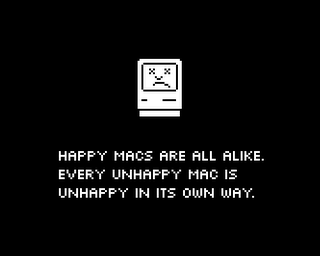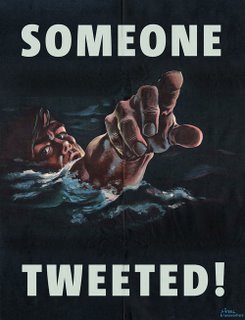Thursday, July 30, 2009
Take Back the Beep Campaign - Pogue’s Posts Blog - NYTimes.com:
These messages are outrageous for two reasons. First, they waste your time. Good heavens: it’s 2009. WE KNOW WHAT TO DO AT THE BEEP.
Do we really need to be told to hang up when we’re finished!? Would anyone, ever, want to “send a numeric page?” Who still carries a pager, for heaven’s sake? Or what about “leave a callback number?” We can SEE the callback number right on our phones!
Second, we’re PAYING for these messages.
These messages are outrageous for two reasons. First, they waste your time. Good heavens: it’s 2009. WE KNOW WHAT TO DO AT THE BEEP.
Do we really need to be told to hang up when we’re finished!? Would anyone, ever, want to “send a numeric page?” Who still carries a pager, for heaven’s sake? Or what about “leave a callback number?” We can SEE the callback number right on our phones!
Second, we’re PAYING for these messages.
Tuesday, July 28, 2009
A human being should be able to change a diaper, plan an invasion, butcher a hog, conn a ship, design a building, write a sonnet, balance accounts, build a wall, set a bone, comfort the dying, take orders, give orders, cooperate, act alone, solve equations, analyze a new problem, pitch manure, program a computer, cook a tasty meal, fight efficiently, die gallantly. Specialization is for insects.
-Robert A. Heinlein
-Robert A. Heinlein
Malcolm Lowry's Under the Volcano:
The novel can be read simply as a story which you can skip if you want. It can be read as a story you will get more out of if you don't skip. It can be regarded as a kind of symphony, or in another way as a kind of opera--or even a horse opera. It is hot music, a poem, a song, a comedy, a farce, and so forth. It is superficial, profound, entertaining, and boring, according to taste. It is a prophecy, a political warning, a cryptogram, a preposterous movie.
- Malcolm Lowry to his publisher Jonathan Cape, January 2, 1946
The novel can be read simply as a story which you can skip if you want. It can be read as a story you will get more out of if you don't skip. It can be regarded as a kind of symphony, or in another way as a kind of opera--or even a horse opera. It is hot music, a poem, a song, a comedy, a farce, and so forth. It is superficial, profound, entertaining, and boring, according to taste. It is a prophecy, a political warning, a cryptogram, a preposterous movie.
- Malcolm Lowry to his publisher Jonathan Cape, January 2, 1946
The Game (mind game) - Wikipedia, the free encyclopedia:
There are three rules to The Game:
1. Everyone in the world is playing The Game. (Sometimes narrowed to: "Everybody in the world who knows about The Game is playing The Game", or alternatively, "You are always playing The Game.")
2. Whenever one thinks about The Game, one loses.
3. Losses must be announced to at least one person (a statement such as "I lost The Game" is often used[citation needed]).
Some players allow a grace period of up to half an hour after someone has lost, during which a player cannot lose The Game again, or is not obliged to announce a loss. According to the common rules, The Game is never ending and there is no way to win. However, one variation of The Game ends when the British Prime Minister announces "The Game is up" on television.
There are three rules to The Game:
1. Everyone in the world is playing The Game. (Sometimes narrowed to: "Everybody in the world who knows about The Game is playing The Game", or alternatively, "You are always playing The Game.")
2. Whenever one thinks about The Game, one loses.
3. Losses must be announced to at least one person (a statement such as "I lost The Game" is often used[citation needed]).
Some players allow a grace period of up to half an hour after someone has lost, during which a player cannot lose The Game again, or is not obliged to announce a loss. According to the common rules, The Game is never ending and there is no way to win. However, one variation of The Game ends when the British Prime Minister announces "The Game is up" on television.
Sunday, July 26, 2009
Thursday, July 23, 2009
Tuesday, July 21, 2009
iPhone prototype goes missing; Chinese worker investigated, commits suicide | VentureBeat:
Last Thursday, 25 year-old Sun Danyong committed suicide after a fourth-generation iPhone prototype he was responsible for went missing. It’s a story, from what tech-industry friends in China tell me, of how Apple’s secretive ways send extreme pressure all the way down the company’s international supply chain.
Last Thursday, 25 year-old Sun Danyong committed suicide after a fourth-generation iPhone prototype he was responsible for went missing. It’s a story, from what tech-industry friends in China tell me, of how Apple’s secretive ways send extreme pressure all the way down the company’s international supply chain.
Mike Daisey to Launch National Tour of Last Cargo Cult: Theater News on TheaterMania.com - 07/21/2009:
rican tour of his solo show, The Last Cargo Cult, in Portland, Oregon at the Institute of Contemporary Art, on August 1. Jean-Michele Gregory will direct.
The work tells the true-life story of Daisey's time on a remote South Pacific island whose inhabitants worship America at the base of a constantly erupting volcano. The tour includes previously announced engagements in Philadelphia as part of the Live Arts Festival (September 4-13), New York City as part of the Public Theater's season (December 3-13), Washington, D.C. as part of Woolly Mammoth's season (January 11-February 7), and Atlanta as part of Alliance Theatre's season (March 19-May 9).
rican tour of his solo show, The Last Cargo Cult, in Portland, Oregon at the Institute of Contemporary Art, on August 1. Jean-Michele Gregory will direct.
The work tells the true-life story of Daisey's time on a remote South Pacific island whose inhabitants worship America at the base of a constantly erupting volcano. The tour includes previously announced engagements in Philadelphia as part of the Live Arts Festival (September 4-13), New York City as part of the Public Theater's season (December 3-13), Washington, D.C. as part of Woolly Mammoth's season (January 11-February 7), and Atlanta as part of Alliance Theatre's season (March 19-May 9).
Monday, July 20, 2009
Daring Fireball: Charging for Access to News Sites:
Old-school news companies aren’t like that — the editorial staff makes up only a fraction of the total head count at major newspaper and magazine companies. The question these companies should be asking is, “How do we keep reporting and publishing good content?” Instead, though, they’re asking “How do we keep making enough money to support our existing management and advertising divisions?” It’s dinosaurs and mammals.
And it’s not really surprising that they’re failing to evolve. The decision-makers — the executives sitting atop large non-editorial management bureaucracies — are exactly the people who need to go if newspapers are going to remain profitable.
Upton Sinclair’s adage comes to mind: “It is difficult to get a man to understand something when his salary depends upon his not understanding it.”
Old-school news companies aren’t like that — the editorial staff makes up only a fraction of the total head count at major newspaper and magazine companies. The question these companies should be asking is, “How do we keep reporting and publishing good content?” Instead, though, they’re asking “How do we keep making enough money to support our existing management and advertising divisions?” It’s dinosaurs and mammals.
And it’s not really surprising that they’re failing to evolve. The decision-makers — the executives sitting atop large non-editorial management bureaucracies — are exactly the people who need to go if newspapers are going to remain profitable.
Upton Sinclair’s adage comes to mind: “It is difficult to get a man to understand something when his salary depends upon his not understanding it.”
Yes, Amy, You Can Be In Love With More Than Two People At The Same Time | Slog | The Stranger:
Amy can't set aside her feelings about adultery long enough to answer the dude's question: "Is it possible to be in love with two people at the same time?" You can be in love with more than one person at the same time. It's more complicated, of course, and running around behind the wife's back isn't the path toward a healthy, functional poly relationship. Successful poly relationships are built on honesty and trust, not lies and betrayals. But they can and do exist.
And maybe Amy knows it: she writes that you don't love two women at the same time, not that you can't. Poor word choice? Or tacit acknowledgement that it is possible to be in love with more than one person at at time? The latter, I think. But open relationships—particularly successful ones—make traditional types like Amy uncomfortable. And as an advice columnist, ahem, Amy gets to declare things in or out of bounds; it's her column, the dude sought her advice. So she says it just isn't "done" because she doesn't think people should, and not because people don't.
Amy can't set aside her feelings about adultery long enough to answer the dude's question: "Is it possible to be in love with two people at the same time?" You can be in love with more than one person at the same time. It's more complicated, of course, and running around behind the wife's back isn't the path toward a healthy, functional poly relationship. Successful poly relationships are built on honesty and trust, not lies and betrayals. But they can and do exist.
And maybe Amy knows it: she writes that you don't love two women at the same time, not that you can't. Poor word choice? Or tacit acknowledgement that it is possible to be in love with more than one person at at time? The latter, I think. But open relationships—particularly successful ones—make traditional types like Amy uncomfortable. And as an advice columnist, ahem, Amy gets to declare things in or out of bounds; it's her column, the dude sought her advice. So she says it just isn't "done" because she doesn't think people should, and not because people don't.
Teenager with Asperger's hoaxes UK aviation industry with fake airline - Boing Boing:
Steve Silberman sez, "An 'enterprising and creative' 17-year-old with Asperger syndrome convinced British aviation officials that he was launching a new airline. Posing as a visionary global entrepreneur -- his email .sig files read 'American Global Group, 35 Countries, 22 Languages, One Team' -- he used phony websites and human engineering to arrange meetings with airport directors and book a local appearance for the 300-person US cast of 'High School Musical.' "
Steve Silberman sez, "An 'enterprising and creative' 17-year-old with Asperger syndrome convinced British aviation officials that he was launching a new airline. Posing as a visionary global entrepreneur -- his email .sig files read 'American Global Group, 35 Countries, 22 Languages, One Team' -- he used phony websites and human engineering to arrange meetings with airport directors and book a local appearance for the 300-person US cast of 'High School Musical.' "
Op-Ed Contributor - Don’t Touch ‘A Moveable Feast’ - NYTimes.com:
BOOKSTORES are getting shipments of a significantly changed edition of Ernest Hemingway’s masterpiece, “A Moveable Feast,” first published posthumously by Scribner in 1964. This new edition, also published by Scribner, has been extensively reworked by a grandson who doesn’t like what the original said about his grandmother, Hemingway’s second wife.
The grandson has removed several sections of the book’s final chapter and replaced them with other writing of Hemingway’s that the grandson feels paints his grandma in a more sympathetic light. Ten other chapters that roused the grandson’s displeasure have been relegated to an appendix, thereby, according to the grandson, creating “a truer representation of the book my grandfather intended to publish.”
Scribner’s involvement with this bowdlerized version should be examined as it relates to the book’s actual genesis, and to the ethics of publishing.
BOOKSTORES are getting shipments of a significantly changed edition of Ernest Hemingway’s masterpiece, “A Moveable Feast,” first published posthumously by Scribner in 1964. This new edition, also published by Scribner, has been extensively reworked by a grandson who doesn’t like what the original said about his grandmother, Hemingway’s second wife.
The grandson has removed several sections of the book’s final chapter and replaced them with other writing of Hemingway’s that the grandson feels paints his grandma in a more sympathetic light. Ten other chapters that roused the grandson’s displeasure have been relegated to an appendix, thereby, according to the grandson, creating “a truer representation of the book my grandfather intended to publish.”
Scribner’s involvement with this bowdlerized version should be examined as it relates to the book’s actual genesis, and to the ethics of publishing.
Why not almost any other famous person? | Radosh.net:
It would be an exaggeration to say that Frank McCourt is the reason I'm a writer, but to the extent that I'm not a terrible writer, he deserves a lot of the credit. McCourt was my high school English teacher. I took several classes with him — anybody who took one always pulled whatever strings they could to get more. It was from him that I learned to listen for "the poetry of everyday language." He despised ornament in writing, vastly preferring elegance. If he heard a word in an essay that wouldn't have come out of your mouth, he'd ask who was supposed to be speaking. And while I can't fully agree with him that no writer should ever use the word "trudge" for that reason, I know that I've never used it. He squeezed out my teenage tendency toward melodrama and clichéd romanticism and drew out gimlet-eyed honesty. He would not like that I just said "gimlet-eyed."
As you can imagine, McCourt's teaching method was largely storytelling. And singing. I will never hear Wild Mountain Thyme without thinking of him. He retired the same year I graduated, and by then he knew he was an inspiring figure. He used to say that when we went on to use his advice to write a book, he'd want 10 percent. Of course, by the time my first book came out, I could have given him 90 percent and it wouldn't have begun to approach 10 percent of what his made. Never has anyone deserved success more completely.
Over the years I'd run into McCourt periodically and he was always warm and friendly. I last saw him a few months ago at an event he did in Woodstock and when I gave him a copy of Rapture Ready! he held it up for the crowd and beamed, "Former student!" It was perhaps the most rewarding response I've had.
Beyond the practical lessons I learned in Frank McCourt's class, I'll always remember him as a model for how to be cynical without being jaded and sarcastic without being inhumane. I'm pretty sure he did not believe in God or an afterlife, but he had to believe that there is an immortality in living so that your words and actions transform the world around you in ways that will continue to reverberate forever. No one with so much life in him can ever truly die. And if there were an afterlife, I can guarantee you that somewhere right now, Frank McCourt would be mightily pissed off that he's not around for what's sure to be a hell of a wake.
It would be an exaggeration to say that Frank McCourt is the reason I'm a writer, but to the extent that I'm not a terrible writer, he deserves a lot of the credit. McCourt was my high school English teacher. I took several classes with him — anybody who took one always pulled whatever strings they could to get more. It was from him that I learned to listen for "the poetry of everyday language." He despised ornament in writing, vastly preferring elegance. If he heard a word in an essay that wouldn't have come out of your mouth, he'd ask who was supposed to be speaking. And while I can't fully agree with him that no writer should ever use the word "trudge" for that reason, I know that I've never used it. He squeezed out my teenage tendency toward melodrama and clichéd romanticism and drew out gimlet-eyed honesty. He would not like that I just said "gimlet-eyed."
As you can imagine, McCourt's teaching method was largely storytelling. And singing. I will never hear Wild Mountain Thyme without thinking of him. He retired the same year I graduated, and by then he knew he was an inspiring figure. He used to say that when we went on to use his advice to write a book, he'd want 10 percent. Of course, by the time my first book came out, I could have given him 90 percent and it wouldn't have begun to approach 10 percent of what his made. Never has anyone deserved success more completely.
Over the years I'd run into McCourt periodically and he was always warm and friendly. I last saw him a few months ago at an event he did in Woodstock and when I gave him a copy of Rapture Ready! he held it up for the crowd and beamed, "Former student!" It was perhaps the most rewarding response I've had.
Beyond the practical lessons I learned in Frank McCourt's class, I'll always remember him as a model for how to be cynical without being jaded and sarcastic without being inhumane. I'm pretty sure he did not believe in God or an afterlife, but he had to believe that there is an immortality in living so that your words and actions transform the world around you in ways that will continue to reverberate forever. No one with so much life in him can ever truly die. And if there were an afterlife, I can guarantee you that somewhere right now, Frank McCourt would be mightily pissed off that he's not around for what's sure to be a hell of a wake.
Frank McCourt, Author of ‘Angela’s Ashes,’ Dies at 78 - Obituary (Obit) - NYTimes.com:
Many don't know that Mr. McCourt's work was intimately informed by the theater:
In 1977, Mr. McCourt and his brother Malachy, who was acting and bartending in New York, cobbled together a series of autobiographical sketches into a two-man play, “A Couple of Blaguards,” which opened off Off Broadway at the Billymunk Theater on East 45th Street. They performed a revised version at the Village Gate in 1984 and again at the Billymunk in 1986 and took their show to several other cities.
This excursion into the past, along with his nagging sense that a writing teacher should write, motivated Mr. McCourt to undertake his childhood memoirs after he retired from teaching in 1987.
Many don't know that Mr. McCourt's work was intimately informed by the theater:
In 1977, Mr. McCourt and his brother Malachy, who was acting and bartending in New York, cobbled together a series of autobiographical sketches into a two-man play, “A Couple of Blaguards,” which opened off Off Broadway at the Billymunk Theater on East 45th Street. They performed a revised version at the Village Gate in 1984 and again at the Billymunk in 1986 and took their show to several other cities.
This excursion into the past, along with his nagging sense that a writing teacher should write, motivated Mr. McCourt to undertake his childhood memoirs after he retired from teaching in 1987.
Sunday, July 19, 2009
Michael Bay Finally Made An Art Movie - Transformers: Revenge of the Fallen - io9:
And the true genius of Transformers: ROTF is that Bay has put all of this excess of imagery and random ideas at the service of the most pandering movie genre there is: the summer movie. ROTF is like twenty summer movies, with unrelated storylines, smushed together into one crazy whole. You try in vain to understand how the pieces fit, you stare into the cracks between the narrative strands, until the cracks become chasms and the chasms become an abyss into which you stare until it looks deep into your own soul, and then you go insane. You. Do. Not. Leave. The Cabinet.
And the true genius of Transformers: ROTF is that Bay has put all of this excess of imagery and random ideas at the service of the most pandering movie genre there is: the summer movie. ROTF is like twenty summer movies, with unrelated storylines, smushed together into one crazy whole. You try in vain to understand how the pieces fit, you stare into the cracks between the narrative strands, until the cracks become chasms and the chasms become an abyss into which you stare until it looks deep into your own soul, and then you go insane. You. Do. Not. Leave. The Cabinet.
Saturday, July 18, 2009
The McGangBang: a McChicken Sandwich Inside a Double Cheeseburger [a chronicle] - Eat Me Daily:
The McGangBang ranks up there in the holy pantheon of WTF. It's a sandwich made from a double cheeseburger and a McChicken sandwich — where you put an entire McChicken sandwich inside a double cheeseburger. It's a creative manipulation of existing menu items, and an exercise in frugality: taking two items off of the Dollar Menu and creating an entirely new sandwich for a total of $2.16. Truly, it's a sandwich that's more than the sum of its parts.
The naming, of course, is somewhat obscene — "gangbang" is defined as "sexual intercourse with multiple partners in turn or at the same time." It's illicit in more ways than one — chicken and beef most definitely make for an unnatural pairing.
In addition, it's sort of a subversive act for people to order it by name, as well as a thrill to confound the McDonald's employee with an order for a McGangBang — so much so that people are documenting their experiences at drive-thrus and counters on YouTube (see the many, many videos after the jump).
The McGangBang ranks up there in the holy pantheon of WTF. It's a sandwich made from a double cheeseburger and a McChicken sandwich — where you put an entire McChicken sandwich inside a double cheeseburger. It's a creative manipulation of existing menu items, and an exercise in frugality: taking two items off of the Dollar Menu and creating an entirely new sandwich for a total of $2.16. Truly, it's a sandwich that's more than the sum of its parts.
The naming, of course, is somewhat obscene — "gangbang" is defined as "sexual intercourse with multiple partners in turn or at the same time." It's illicit in more ways than one — chicken and beef most definitely make for an unnatural pairing.
In addition, it's sort of a subversive act for people to order it by name, as well as a thrill to confound the McDonald's employee with an order for a McGangBang — so much so that people are documenting their experiences at drive-thrus and counters on YouTube (see the many, many videos after the jump).
The Genre Artist - NYTimes.com:
Jack Vance, described by his peers as “a major genius” and “the greatest living writer of science fiction and fantasy,” has been hidden in plain sight for as long as he has been publishing — six decades and counting. Yes, he has won Hugo, Nebula and World Fantasy awards and has been named a Grand Master by the Science Fiction and Fantasy Writers of America, and he received an Edgar from the Mystery Writers of America, but such honors only help to camouflage him as just another accomplished genre writer. So do the covers of his books, which feature the usual spacecraft, monsters and euphonious place names: Lyonesse, Alastor, Durdane. If you had never read Vance and were browsing a bookstore’s shelf, you might have no particular reason to choose one of his books instead of one next to it by A. E. van Vogt, say, or John Varley. And if you chose one of these alternatives, you would go on your way to the usual thrills with no idea that you had just missed out on encountering one of American literature’s most distinctive and undervalued voices.
Jack Vance, described by his peers as “a major genius” and “the greatest living writer of science fiction and fantasy,” has been hidden in plain sight for as long as he has been publishing — six decades and counting. Yes, he has won Hugo, Nebula and World Fantasy awards and has been named a Grand Master by the Science Fiction and Fantasy Writers of America, and he received an Edgar from the Mystery Writers of America, but such honors only help to camouflage him as just another accomplished genre writer. So do the covers of his books, which feature the usual spacecraft, monsters and euphonious place names: Lyonesse, Alastor, Durdane. If you had never read Vance and were browsing a bookstore’s shelf, you might have no particular reason to choose one of his books instead of one next to it by A. E. van Vogt, say, or John Varley. And if you chose one of these alternatives, you would go on your way to the usual thrills with no idea that you had just missed out on encountering one of American literature’s most distinctive and undervalued voices.
Friday, July 17, 2009
Some E-Books Are More Equal Than Others - Pogue’s Posts Blog - NYTimes.com:
This morning, hundreds of Amazon Kindle owners awoke to discover that books by a certain famous author had mysteriously disappeared from their e-book readers. These were books that they had bought and paid for—thought they owned.
But no, apparently the publisher changed its mind about offering an electronic edition, and apparently Amazon, whose business lives and dies by publisher happiness, caved. It electronically deleted all books by this author from people’s Kindles and credited their accounts for the price.
This is ugly for all kinds of reasons. Amazon says that this sort of thing is “rare,” but that it can happen at all is unsettling; we’ve been taught to believe that e-books are, you know, just like books, only better. Already, we’ve learned that they’re not really like books, in that once we’re finished reading them, we can’t resell or even donate them. But now we learn that all sales may not even be final.
As one of my readers noted, it’s like Barnes & Noble sneaking into our homes in the middle of the night, taking some books that we’ve been reading off our nightstands, and leaving us a check on the coffee table.
You want to know the best part? The juicy, plump, dripping irony?
The author who was the victim of this Big Brotherish plot was none other than George Orwell. And the books were “1984” and “Animal Farm.”
This morning, hundreds of Amazon Kindle owners awoke to discover that books by a certain famous author had mysteriously disappeared from their e-book readers. These were books that they had bought and paid for—thought they owned.
But no, apparently the publisher changed its mind about offering an electronic edition, and apparently Amazon, whose business lives and dies by publisher happiness, caved. It electronically deleted all books by this author from people’s Kindles and credited their accounts for the price.
This is ugly for all kinds of reasons. Amazon says that this sort of thing is “rare,” but that it can happen at all is unsettling; we’ve been taught to believe that e-books are, you know, just like books, only better. Already, we’ve learned that they’re not really like books, in that once we’re finished reading them, we can’t resell or even donate them. But now we learn that all sales may not even be final.
As one of my readers noted, it’s like Barnes & Noble sneaking into our homes in the middle of the night, taking some books that we’ve been reading off our nightstands, and leaving us a check on the coffee table.
You want to know the best part? The juicy, plump, dripping irony?
The author who was the victim of this Big Brotherish plot was none other than George Orwell. And the books were “1984” and “Animal Farm.”
Thursday, July 16, 2009
This Will Not Fool Anyone | Slog | The Stranger:
The Seattle Times (who, as Dominic previously noted, are doing very good work today) gets to the bottom of the story: It seems as though Starbucks is dropping their branded name from three Seattle locations and reopening with generic, neighborhood-centric names instead. For instance, the Starbucks on 15th will now be known as "15th Avenue Coffee and Tea." It will serve wine and beer and host poetry readings. It's like they listened to all the complaints about Starbucks closing local businesses and sapping the flavor from neighborhoods and then took the most dunderheaded, obvious action to take advantage of those complaints.
The Seattle Times (who, as Dominic previously noted, are doing very good work today) gets to the bottom of the story: It seems as though Starbucks is dropping their branded name from three Seattle locations and reopening with generic, neighborhood-centric names instead. For instance, the Starbucks on 15th will now be known as "15th Avenue Coffee and Tea." It will serve wine and beer and host poetry readings. It's like they listened to all the complaints about Starbucks closing local businesses and sapping the flavor from neighborhoods and then took the most dunderheaded, obvious action to take advantage of those complaints.
This just in: Tony Awards nix crix | Upstaged | Time Out New York:
The ax fell quietly, by e-mail, at a little before 6pm today. “After careful consideration,” begins the letter from Tony Award Productions, “the Tony Awards Management Committee has determined that Tony-voting privileges will no longer be extended to members of the First Night Press List, commencing with the 2009–2010 season.” In other words: Critics are hereby purged from the Tony voting rolls. No official reasons for this decision are given, but the letter goes on to note that critics already get to have their say during the year, and that “certain publications and individual critics have historically pursued a policy of abstaining from voting on entertainment awards in general, to avoid any possible conflicts of interest in fulfilling their primary responsibilities as journalists.”
This strikes us as a disappointing decision. Critics have long been part of the Tony voting pool, alongside industry insiders from the American Theatre Wing, Actors’ Equity Association, the Dramatists Guild, the Society of Stage Directors and Choreographers, United Scenic Artists and other groups. The rationale for the new exclusion—a vague allusion to conflicts of interest, the precise nature of which are hard to imagine—is thin stuff indeed. If anything, critics are among the voters least compromised by conflicts of interest, and most likely to vote objectively and fairly for the work they judge to be best. (The others are liable to have greater personal, professional and financial stakes in the outcome.) The excision of this voting block represents a step backward in the seriousness of the awards.
The ax fell quietly, by e-mail, at a little before 6pm today. “After careful consideration,” begins the letter from Tony Award Productions, “the Tony Awards Management Committee has determined that Tony-voting privileges will no longer be extended to members of the First Night Press List, commencing with the 2009–2010 season.” In other words: Critics are hereby purged from the Tony voting rolls. No official reasons for this decision are given, but the letter goes on to note that critics already get to have their say during the year, and that “certain publications and individual critics have historically pursued a policy of abstaining from voting on entertainment awards in general, to avoid any possible conflicts of interest in fulfilling their primary responsibilities as journalists.”
This strikes us as a disappointing decision. Critics have long been part of the Tony voting pool, alongside industry insiders from the American Theatre Wing, Actors’ Equity Association, the Dramatists Guild, the Society of Stage Directors and Choreographers, United Scenic Artists and other groups. The rationale for the new exclusion—a vague allusion to conflicts of interest, the precise nature of which are hard to imagine—is thin stuff indeed. If anything, critics are among the voters least compromised by conflicts of interest, and most likely to vote objectively and fairly for the work they judge to be best. (The others are liable to have greater personal, professional and financial stakes in the outcome.) The excision of this voting block represents a step backward in the seriousness of the awards.
Wednesday, July 15, 2009
The History of the Gyro, With a Dollop of Serendipity - NYTimes.com:
“The trick,” he yelled in a heavy Greek accent, “is to use certain forces, like temperature and pressure, to preserve the product as a solid mass, so it doesn’t deteriorate.”
A dapper man with a rich baritone voice and a gray mustache, Mr. Tomaras, 73, was narrating a tour of Kronos Foods, the world’s largest manufacturer of gyros (pronounced YEE-ros, Greek for “spin”), the don’t-ask mystery meat that has been a Greek restaurant staple in the United States since the mid 1970s. Cones of gyro meat rotate on an estimated 50,000 vertical broilers across the country, to be carved a few slices at a time and folded in pita bread along with a dollop of yogurt sauce.
“The trick,” he yelled in a heavy Greek accent, “is to use certain forces, like temperature and pressure, to preserve the product as a solid mass, so it doesn’t deteriorate.”
A dapper man with a rich baritone voice and a gray mustache, Mr. Tomaras, 73, was narrating a tour of Kronos Foods, the world’s largest manufacturer of gyros (pronounced YEE-ros, Greek for “spin”), the don’t-ask mystery meat that has been a Greek restaurant staple in the United States since the mid 1970s. Cones of gyro meat rotate on an estimated 50,000 vertical broilers across the country, to be carved a few slices at a time and folded in pita bread along with a dollop of yogurt sauce.
Tuesday, July 14, 2009
Why BusinessWeek Sale Might Only Fetch $1 (MHP):
BusinessWeek is on the block as McGraw-Hill trims the fat. Buyers could include private equity firms or Mansueto Ventures, which publishes Inc. and Fast Company. But one stat has gotten a lot of attention: The FT's assertion yesterday that like TV Guide, BusinessWeek might only sell for $1.
Why so little? How is that possible?
BusinessWeek is on the block as McGraw-Hill trims the fat. Buyers could include private equity firms or Mansueto Ventures, which publishes Inc. and Fast Company. But one stat has gotten a lot of attention: The FT's assertion yesterday that like TV Guide, BusinessWeek might only sell for $1.
Why so little? How is that possible?
Actors' Equity Raises Showcase Code Limits:
Actor’s Equity is making modifications its Showcase Code to increase limits under which the majority of Off-Off-Broadway productions operate. The changes go into effect May 25th 2009, according to documents posted on Equity’s website.
Actor’s Equity is making modifications its Showcase Code to increase limits under which the majority of Off-Off-Broadway productions operate. The changes go into effect May 25th 2009, according to documents posted on Equity’s website.
Visa claims teen spent $23,148,855,308,184,500.00 on prepaid credit card - Boing Boing:

Visa recorded a $23,148,855,308,184,500.00 purchase on Consumerist reader Dale's kid's prepaid Visa Buxx card: "My lectures about financial responsibility appear to have failed: yesterday she charged $23,148,855,308,184,500.00 at the drug store. That's 2,000 times more than the national debt, which is a paltry 11 trillion. The ever-vigilant folks at VISA added a $20 'negative balance fee,' and have suspended the card."

Visa recorded a $23,148,855,308,184,500.00 purchase on Consumerist reader Dale's kid's prepaid Visa Buxx card: "My lectures about financial responsibility appear to have failed: yesterday she charged $23,148,855,308,184,500.00 at the drug store. That's 2,000 times more than the national debt, which is a paltry 11 trillion. The ever-vigilant folks at VISA added a $20 'negative balance fee,' and have suspended the card."
Southampton News - From script to the stage - 27east:
Theater enthusiasts in the region can also enjoy the talent the new conference has gathered in Southampton. Between Thursday, July 16, and Thursday, July 30, the conference is host to five separate nights of contemporary plays open to the public, three of them still in the developmental stage—including two brand new works presented by the Ensemble Studio Theater and one monologue by Mike Daisey called “The Last Cargo Cult.”
Playwriting is the fourth summer discipline that Stony Brook Southampton’s master of fine arts in writing and literature program now sponsors, after adding children’s literature and screenwriting components to the Southampton Writers Conference last summer. The original core of the conference, with workshops in poetry, fiction and creative non-fiction, features writers such as Billy Collins, Frank McCourt, Roger Rosenblatt, Ursula Hegi and Alan Alda, as well as this year’s keynote speaker, Richard Ford.
Theater enthusiasts in the region can also enjoy the talent the new conference has gathered in Southampton. Between Thursday, July 16, and Thursday, July 30, the conference is host to five separate nights of contemporary plays open to the public, three of them still in the developmental stage—including two brand new works presented by the Ensemble Studio Theater and one monologue by Mike Daisey called “The Last Cargo Cult.”
Playwriting is the fourth summer discipline that Stony Brook Southampton’s master of fine arts in writing and literature program now sponsors, after adding children’s literature and screenwriting components to the Southampton Writers Conference last summer. The original core of the conference, with workshops in poetry, fiction and creative non-fiction, features writers such as Billy Collins, Frank McCourt, Roger Rosenblatt, Ursula Hegi and Alan Alda, as well as this year’s keynote speaker, Richard Ford.
Monday, July 13, 2009
The Form That Lets You Say, ‘More Forms, Please’ - City Room Blog - NYTimes.com:
Last year, Americans spent nearly 10 billion hours [pdf] filling out more than 8,000 different government forms and other official requests for information tracked by the federal budget office. That compares with roughly one billion hours spent on similar paperwork in 1981, which in hindsight looks to have been a refreshingly uncomplicated time.
“Jumping up to 10 billion in 20 years’’ is no small feat, said David S. Cordray, a statistics professor at Vanderbilt University, who oversaw reports on government bureaucracy as a former federal official. “I wish the stock market had done that.’’
Last year, Americans spent nearly 10 billion hours [pdf] filling out more than 8,000 different government forms and other official requests for information tracked by the federal budget office. That compares with roughly one billion hours spent on similar paperwork in 1981, which in hindsight looks to have been a refreshingly uncomplicated time.
“Jumping up to 10 billion in 20 years’’ is no small feat, said David S. Cordray, a statistics professor at Vanderbilt University, who oversaw reports on government bureaucracy as a former federal official. “I wish the stock market had done that.’’
Sunday, July 12, 2009
Tina Brown Eulogizes Her Party Planner, His Bombass Parties, And Herself - Tina Brown - Gawker:
All Tina's eulogy/wake-a-sleeping-dog dissection into history does is serve to remind many of the publications and people who used these extravagances of their asinine spending habits of yore that preceded the poor, shitshow shape they're in now (like Vanity Fair, which had to fire so much of it's support staff, or Talk, which is, again, long dead, but was a trendsetter as far as the "magazine launches signify magazine deaths" trend). Or of their jobs, which they used to have.
Is there any question as to why that aforementioned schadenfreude ever existed, though? These parties, though probably fun, cost ridiculous amounts of money, and were only accessible to a microscopic percentage of New York, let alone the rest of America. Much like the things they were meant to celebrate. And, naturally, much like this blog post about them.
All Tina's eulogy/wake-a-sleeping-dog dissection into history does is serve to remind many of the publications and people who used these extravagances of their asinine spending habits of yore that preceded the poor, shitshow shape they're in now (like Vanity Fair, which had to fire so much of it's support staff, or Talk, which is, again, long dead, but was a trendsetter as far as the "magazine launches signify magazine deaths" trend). Or of their jobs, which they used to have.
Is there any question as to why that aforementioned schadenfreude ever existed, though? These parties, though probably fun, cost ridiculous amounts of money, and were only accessible to a microscopic percentage of New York, let alone the rest of America. Much like the things they were meant to celebrate. And, naturally, much like this blog post about them.
Saturday, July 11, 2009
Palin: How she gained control and then lost it:
So let me say it for her: Sarah Palin will not be a candidate for the 2012 Republican presidential nomination.
What during the run-up to the 2012 presidential election Sarah will be is a Republican celebrity the way that Bill Clinton is a Democratic celebrity. Giving speeches in convention halls packed with true-believing party faithful and being fawned over by the network paparazzi will be a whole lot more fun, and way more profitable, than being a candidate. And it certainly will be more fun and way more profitable than being the Governor of a backwater state that is an hour's drive from Wasilla to the Anchorage airport and then three-plus more hours of flight time from anywhere important.
Once Sarah made the easy decision that she would not run for reelection in 2010 so that during the two years prior to the 2012 presidential election she can be a full-time celebrity, the decision to become one immediately, rather than waiting another year and a half for her term as Governor to expire, was a no-brainer.
So let me say it for her: Sarah Palin will not be a candidate for the 2012 Republican presidential nomination.
What during the run-up to the 2012 presidential election Sarah will be is a Republican celebrity the way that Bill Clinton is a Democratic celebrity. Giving speeches in convention halls packed with true-believing party faithful and being fawned over by the network paparazzi will be a whole lot more fun, and way more profitable, than being a candidate. And it certainly will be more fun and way more profitable than being the Governor of a backwater state that is an hour's drive from Wasilla to the Anchorage airport and then three-plus more hours of flight time from anywhere important.
Once Sarah made the easy decision that she would not run for reelection in 2010 so that during the two years prior to the 2012 presidential election she can be a full-time celebrity, the decision to become one immediately, rather than waiting another year and a half for her term as Governor to expire, was a no-brainer.
The Paris Review - The Art of Nonfiction No. 2:
INTERVIEWER
Surely there must be some days in the middle of a project, when you’re really going, that you write more than a single page.
TALESE
No, there aren’t.
INTERVIEWER
But your books are so long.
TALESE
I take a long time. I have published relatively little given how long I have been working. Over fifty-five years I’ve only written five long books, two short ones, and four collections. It’s not that many.
INTERVIEWER
Do you use notebooks when you are reporting?
TALESE
I don’t use notebooks. I use shirt boards.
INTERVIEWER
You mean the cardboard from dry-cleaned shirts?
TALESE
Exactly. I cut the shirt board into four parts and I cut the corners into round edges, so that they can fit in my pocket. I also use full shirt boards when I’m writing my outlines. I’ve been doing this since the fifties.
INTERVIEWER
So all day long you’re writing your observations on shirt boards?
INTERVIEWER
Surely there must be some days in the middle of a project, when you’re really going, that you write more than a single page.
TALESE
No, there aren’t.
INTERVIEWER
But your books are so long.
TALESE
I take a long time. I have published relatively little given how long I have been working. Over fifty-five years I’ve only written five long books, two short ones, and four collections. It’s not that many.
INTERVIEWER
Do you use notebooks when you are reporting?
TALESE
I don’t use notebooks. I use shirt boards.
INTERVIEWER
You mean the cardboard from dry-cleaned shirts?
TALESE
Exactly. I cut the shirt board into four parts and I cut the corners into round edges, so that they can fit in my pocket. I also use full shirt boards when I’m writing my outlines. I’ve been doing this since the fifties.
INTERVIEWER
So all day long you’re writing your observations on shirt boards?
iPhone/Touch Platform:
Dear iPhone Developers: please make an AT&T 3G coverage recording app. Record AT&T network strength + status + changes and tag GPS coordinates. Push the data to a central google map. Filter the data by time, so we can see the effects of rush hour, and if data quality is getting better or worse over time.
Dear iPhone Developers: please make an AT&T 3G coverage recording app. Record AT&T network strength + status + changes and tag GPS coordinates. Push the data to a central google map. Filter the data by time, so we can see the effects of rush hour, and if data quality is getting better or worse over time.
Friday, July 10, 2009
Gotham Cops Collar Vigilante Batman, Superman In Times Square! - Gothamist:
And naturally these two goons, who presume themselves to be above the law, weren't about to go down without a fight. When the men in tights refused to produce proper identification, officers quickly cuffed Batman, while Superman flew off, screaming, "I'm not getting arrested!" Witness Ryan McCormick tells the Post, "The Man of Steel didn't go down with just two officers, it took seven officers! He was putting up a good fight. Little kids were like, 'Mommy, it's Superman!' " The Batman quickly confessed that Superman, his cowardly cohort, "freaked out and punched the girl cop in the face."
And naturally these two goons, who presume themselves to be above the law, weren't about to go down without a fight. When the men in tights refused to produce proper identification, officers quickly cuffed Batman, while Superman flew off, screaming, "I'm not getting arrested!" Witness Ryan McCormick tells the Post, "The Man of Steel didn't go down with just two officers, it took seven officers! He was putting up a good fight. Little kids were like, 'Mommy, it's Superman!' " The Batman quickly confessed that Superman, his cowardly cohort, "freaked out and punched the girl cop in the face."
Wednesday, July 08, 2009
Facebook | Scott Rosenberg's Notes:
Note the alternatives Philips offers: You might blog for money. You might blog for fame or influence or as a “loss leader” for your real business. But nowhere in his world is there room for the actual motivation that drives most bloggers: a desire to express themselves, to think out loud, to exult in the possibilities of writing in public — and learn from the pitfalls, too. Maybe there’s a payoff in enhancing your reputation, but there can also be a payoff in simply enhancing your experience at communicating your thoughts and ideas. Speaking to a big crowd is alluring but speaking even to a small group of friends is rewarding, too. For the great majority of participants, blogging is a social activity, not an aspiration to mass-media stardom.
It is very hard for journalists to understand this because the opportunity to express themselves in public has always been a part of their professional birthright. So they won’t notice that motivation even when it’s staring them in the face. When you point this out, you are almost always greeted with a sort of cynical sniff: You can’t be serious. But I am!
Note the alternatives Philips offers: You might blog for money. You might blog for fame or influence or as a “loss leader” for your real business. But nowhere in his world is there room for the actual motivation that drives most bloggers: a desire to express themselves, to think out loud, to exult in the possibilities of writing in public — and learn from the pitfalls, too. Maybe there’s a payoff in enhancing your reputation, but there can also be a payoff in simply enhancing your experience at communicating your thoughts and ideas. Speaking to a big crowd is alluring but speaking even to a small group of friends is rewarding, too. For the great majority of participants, blogging is a social activity, not an aspiration to mass-media stardom.
It is very hard for journalists to understand this because the opportunity to express themselves in public has always been a part of their professional birthright. So they won’t notice that motivation even when it’s staring them in the face. When you point this out, you are almost always greeted with a sort of cynical sniff: You can’t be serious. But I am!
Tuesday, July 07, 2009
The Daily Dish | By Andrew Sullivan:
Palin lied when she said the dismissal of her public safety commissioner, Walt Monegan, had nothing to do with his refusal to fire state trooper Mike Wooten; in fact, the Branchflower Report concluded that she repeatedly abused her power when dealing with both men.
Palin lied when she repeatedly claimed to have said, "Thanks, but no thanks" to the Bridge to Nowhere; in fact, she openly campaigned for the federal project when running for governor.
Palin lied when she denied that Wasilla's police chief and librarian had been fired; in fact, both were given letters of termination the previous day.
Palin lied when she wrote in the NYT that a comprehensive review by Alaska wildlife officials showed that polar bears were not endangered; in fact, email correspondence between those scientists showed the opposite.
Palin lied when she claimed in her convention speech that an oil pipeline "began" under her guidance; in fact, the pipeline was years from breaking ground, if at all.
Palin lied when she told Charlie Gibson that she does not pass judgment on gay people; in fact, she opposes all rights between gay spouses and belongs to a church that promotes conversion therapy.
Palin lied when she denied having said that humans do not contribute to climate change; in fact, she had previously proclaimed that human activity was not to blame.
Palin lied when she claimed that Alaska produces 20 percent of the country's domestic energy supply; in fact, the actual figures, based on any interpretation of her words, are much, much lower.
Palin lied when she told voters she improvised her convention speech when her teleprompter stopped working properly; in fact, all reports showed that the machine had functioned perfectly and that her speech had closely followed the script.
Palin lied when she recalled asking her daughters to vote on whether she should accept the VP offer; in fact, her story contradicts details given by her husband, the McCain campaign, and even Palin herself. (She later added another version.)
Palin lied when she claimed to have taken a voluntary pay cut as mayor; in fact, as councilmember she had voted against a raise for the mayor, but subsequent raises had taken effect by the time she was mayor.
Palin lied when she insisted that Wooten's divorce proceedings had caused his confidential records to become public; in fact, court officials confirmed they released no such records.
Palin lied when she suggested to Katie Couric that she was involved in trade missions with Russia; in fact, she has never even met with Russian officials.
Palin lied when she told Shimon Peres that the only flag in her office was the Israeli flag; in fact, she has several flags.
Palin lied when she claimed to have tried to divest government funds from Sudan; in fact, her administration openly opposed a bill that would have done just that.
Palin lied when she repeatedly claimed that troop levels in Iraq were back to pre-surge levels; in fact, even she acknowledged her "misstatements," though she refused to retract or apologize.
Palin lied when she insisted that the Branchflower Report "showed there was no unlawful or unethical activity on my part"; in fact, that report prominently stated, "Palin abused her power by violating Alaska Statute 39.52.110(a) of the Alaska Executive Branch Ethics Act."
Palin lied when she claimed to have voiced concerns over Wooten fearing he would harm her family; in fact, she actually decreased her security detail during that period.
Palin lied when asked about the $150,000 worth of clothes provided by the RNC; in fact, solid reporting contradicted several parts of her statement.
Palin lied when she suggested that she had offered the media proof of her pregnancy with Trig to "correct the record; in fact, no reports of her medical records were ever published; and the letter from her doctor testifying to her good health only emerged hours before polling ended on election day, even though there was nothing in it that couldn't have been released two months earlier.
Palin lied when she said that "reported" allegations of her banning Harry Potter as mayor was easily refutable because it had not even been written yet; in fact, the first book in that series was published in 1998 - two years into her first term - and such rumors were never reported by the media, only circulated as emails.
Palin lied when she denied having participated in a clothes audit with campaign laywers; in fact, the Washington Times later confirmed those details.
Palin lied when asked about Couric's question regarding her reading habits; in fact, Couric's words were not, "What do you read up there in Alaska?" or anything close to condescension.
Palin lied when she mischaracterized the "$1200 check" given to Alaskans as the permanent fund dividend check; in fact, that fund had yielded $2,069 per person, and she claimed otherwise to obscure the fact that Alaskans also received a $1200 rebate check from a windfall profits tax on oil companies - a tax widely criticized by Republicans.
Palin lied when she claimed to be unaware of a turkey being slaughtered behind her during a filmed interview; in fact, the cameraman said she had picked the spot herself, while the slaughter was underway.
Palin lied when she denied having rejected federal stimulus money; in fact, she continued to accept and reject the funds several times.
Palin lied when she claimed that legislative leaders had canceled a meeting with her to hold their own press conference; in fact, they only canceled it after being told she would not participate, and the purpose of the press conference was very different from the meeting's.
Palin lied when she announced on the news that she never holds closed-door meetings; in fact, she had just attended a closed-door meeting with the legislature earlier that day.
Palin lied when she said that former aide John Bitney's "amicable" departure was for "personal" reasons; in fact, Bitney said he was fired because of his relationship with the wife of Palin's friend, plus a Palin spokesperson later claimed "poor job performance" for his firing - without elaborating.
Palin lied when she said she kept her running injury a secret on the campaign trail; in fact, her bandaged hand was clearly visible in photographs and the story was widely talked about.
Palin lied when she claimed that Alaska has spent "millions of dollars" on litigation related to her ethics complaints; in fact, that figure is much, much lower, and she had initiated the most expensive inquiry.
Palin lied when she denied that the Alaska Independence Party supports secession and denied that her husband had been a member; in fact, even the McCain campaign noted that the party's very existence is based on secession and that Todd was a member for seven years.
Palin lied when she said the dismissal of her public safety commissioner, Walt Monegan, had nothing to do with his refusal to fire state trooper Mike Wooten; in fact, the Branchflower Report concluded that she repeatedly abused her power when dealing with both men.
Palin lied when she repeatedly claimed to have said, "Thanks, but no thanks" to the Bridge to Nowhere; in fact, she openly campaigned for the federal project when running for governor.
Palin lied when she denied that Wasilla's police chief and librarian had been fired; in fact, both were given letters of termination the previous day.
Palin lied when she wrote in the NYT that a comprehensive review by Alaska wildlife officials showed that polar bears were not endangered; in fact, email correspondence between those scientists showed the opposite.
Palin lied when she claimed in her convention speech that an oil pipeline "began" under her guidance; in fact, the pipeline was years from breaking ground, if at all.
Palin lied when she told Charlie Gibson that she does not pass judgment on gay people; in fact, she opposes all rights between gay spouses and belongs to a church that promotes conversion therapy.
Palin lied when she denied having said that humans do not contribute to climate change; in fact, she had previously proclaimed that human activity was not to blame.
Palin lied when she claimed that Alaska produces 20 percent of the country's domestic energy supply; in fact, the actual figures, based on any interpretation of her words, are much, much lower.
Palin lied when she told voters she improvised her convention speech when her teleprompter stopped working properly; in fact, all reports showed that the machine had functioned perfectly and that her speech had closely followed the script.
Palin lied when she recalled asking her daughters to vote on whether she should accept the VP offer; in fact, her story contradicts details given by her husband, the McCain campaign, and even Palin herself. (She later added another version.)
Palin lied when she claimed to have taken a voluntary pay cut as mayor; in fact, as councilmember she had voted against a raise for the mayor, but subsequent raises had taken effect by the time she was mayor.
Palin lied when she insisted that Wooten's divorce proceedings had caused his confidential records to become public; in fact, court officials confirmed they released no such records.
Palin lied when she suggested to Katie Couric that she was involved in trade missions with Russia; in fact, she has never even met with Russian officials.
Palin lied when she told Shimon Peres that the only flag in her office was the Israeli flag; in fact, she has several flags.
Palin lied when she claimed to have tried to divest government funds from Sudan; in fact, her administration openly opposed a bill that would have done just that.
Palin lied when she repeatedly claimed that troop levels in Iraq were back to pre-surge levels; in fact, even she acknowledged her "misstatements," though she refused to retract or apologize.
Palin lied when she insisted that the Branchflower Report "showed there was no unlawful or unethical activity on my part"; in fact, that report prominently stated, "Palin abused her power by violating Alaska Statute 39.52.110(a) of the Alaska Executive Branch Ethics Act."
Palin lied when she claimed to have voiced concerns over Wooten fearing he would harm her family; in fact, she actually decreased her security detail during that period.
Palin lied when asked about the $150,000 worth of clothes provided by the RNC; in fact, solid reporting contradicted several parts of her statement.
Palin lied when she suggested that she had offered the media proof of her pregnancy with Trig to "correct the record; in fact, no reports of her medical records were ever published; and the letter from her doctor testifying to her good health only emerged hours before polling ended on election day, even though there was nothing in it that couldn't have been released two months earlier.
Palin lied when she said that "reported" allegations of her banning Harry Potter as mayor was easily refutable because it had not even been written yet; in fact, the first book in that series was published in 1998 - two years into her first term - and such rumors were never reported by the media, only circulated as emails.
Palin lied when she denied having participated in a clothes audit with campaign laywers; in fact, the Washington Times later confirmed those details.
Palin lied when asked about Couric's question regarding her reading habits; in fact, Couric's words were not, "What do you read up there in Alaska?" or anything close to condescension.
Palin lied when she mischaracterized the "$1200 check" given to Alaskans as the permanent fund dividend check; in fact, that fund had yielded $2,069 per person, and she claimed otherwise to obscure the fact that Alaskans also received a $1200 rebate check from a windfall profits tax on oil companies - a tax widely criticized by Republicans.
Palin lied when she claimed to be unaware of a turkey being slaughtered behind her during a filmed interview; in fact, the cameraman said she had picked the spot herself, while the slaughter was underway.
Palin lied when she denied having rejected federal stimulus money; in fact, she continued to accept and reject the funds several times.
Palin lied when she claimed that legislative leaders had canceled a meeting with her to hold their own press conference; in fact, they only canceled it after being told she would not participate, and the purpose of the press conference was very different from the meeting's.
Palin lied when she announced on the news that she never holds closed-door meetings; in fact, she had just attended a closed-door meeting with the legislature earlier that day.
Palin lied when she said that former aide John Bitney's "amicable" departure was for "personal" reasons; in fact, Bitney said he was fired because of his relationship with the wife of Palin's friend, plus a Palin spokesperson later claimed "poor job performance" for his firing - without elaborating.
Palin lied when she said she kept her running injury a secret on the campaign trail; in fact, her bandaged hand was clearly visible in photographs and the story was widely talked about.
Palin lied when she claimed that Alaska has spent "millions of dollars" on litigation related to her ethics complaints; in fact, that figure is much, much lower, and she had initiated the most expensive inquiry.
Palin lied when she denied that the Alaska Independence Party supports secession and denied that her husband had been a member; in fact, even the McCain campaign noted that the party's very existence is based on secession and that Todd was a member for seven years.
johnbyronkuhner.com / The purpose of despotic government…:
But I wish I could challenge the tickets of the other men. It was so clearly wrong, and the cops who did it – six cops! – clearly were operating with such guilty consciences that I felt sorry for them. But I did fire a parting shot as I got my summons, telling them that bad people did only fifty percent of the world’s evil, but another fifty percent was done by good people who acted contrary to their own sense of right and wrong but followed orders nonetheless. “Go back and tell your superiors you won’t do this again. Go back and tell them you think it’s wrong and it’s not police work and not what governments are supposed to do. Because you know what I’m saying is true.” I then walked off and waited for the next train. It was about forty minutes out of my morning. I arrived back home at 7:30 a.m.
And I’ll reiterate, it really was wrong. Entirely contrary to the spirit of the city. When people tell me they like Bloomberg, I can hardly believe it. The virtue of Midas is no virtue for a man.
But I wish I could challenge the tickets of the other men. It was so clearly wrong, and the cops who did it – six cops! – clearly were operating with such guilty consciences that I felt sorry for them. But I did fire a parting shot as I got my summons, telling them that bad people did only fifty percent of the world’s evil, but another fifty percent was done by good people who acted contrary to their own sense of right and wrong but followed orders nonetheless. “Go back and tell your superiors you won’t do this again. Go back and tell them you think it’s wrong and it’s not police work and not what governments are supposed to do. Because you know what I’m saying is true.” I then walked off and waited for the next train. It was about forty minutes out of my morning. I arrived back home at 7:30 a.m.
And I’ll reiterate, it really was wrong. Entirely contrary to the spirit of the city. When people tell me they like Bloomberg, I can hardly believe it. The virtue of Midas is no virtue for a man.
Monday, July 06, 2009
Ryanair to make passengers stand in bid to cram more on board | Mail Online:
Ryanair wants passengers to stand during its flights so the budget airline can squeeze more people onboard.
The Irish air carrier plans to cut costs by making fliers perch on stools with seatbelts around their waists.
Chief executive Michael O'Leary has already held talks with US plane manufacturer Boeing about designing an aircraft with standing room.
Ryanair wants passengers to stand during its flights so the budget airline can squeeze more people onboard.
The Irish air carrier plans to cut costs by making fliers perch on stools with seatbelts around their waists.
Chief executive Michael O'Leary has already held talks with US plane manufacturer Boeing about designing an aircraft with standing room.
Sunday, July 05, 2009
I found this recent post by David Dower interesting and problematic for a couple of reasons. I don't know David well, though we've had lunch in the past and are colleagues in the theater. I've been happy he found a new post at Arena Stage in DC that he seems compelled by, and I am glad he's blogging.
That said, it is difficult to swallow in the middle of a rather vanilla progressive post about what we can do to come together and build a bright future for American theater, this:
While I'm at it, I'll dissent on some other engagement. I've stayed out of the slug-fest that is the Olson-Daisey chain. (I'm not even going to link it, that's how much I'm staying out of it. You can look it up if you've been buried in grant deadlines, or your day job, or off on an artistic retreat and missed the dust-up.) Why? The whole conversation is stuck in the past and seems to burn up important energy for actually moving forward.
Everyone is always free to engage or not, but it must be said that this is part of how the status quo is maintained. While I've already commented here publicly on how that conversation may not have been the most polite, it was at least an honest and full-throated collision between the viewpoints of theater professionals, and between artists and administrators.
If it feels "stuck in the past", maybe that says something truthful about where the world actually is. If more people chimed in with constructive things to say, or built from the dialogue provided for you, perhaps something productive would occur. Or perhaps it has already triggered reactions from others, as I know it has, and been valuable that way. If it "burns up important energy", I'd like to see the engaged discussions that are happening online between administrators and artists that are so vibrant that they make it superfluous. Point me to them, because I don't see them happening.
The truth is, if it wasn't a great conversation no one truly paid in time but myself and Mr. Olson. But if we all find it ugly and distasteful and believe it has no value, it really is a choice for silence over engagement. You don't have to approve of an interaction to have a conversation, and if we actually talk about how theater works in America, where the power flows to and how it is distributed, more than feelings are going to be bruised over time.
Dower continues:
The issue is not locked boxes for actor endowments or blowing up the buildings or turning more artists into administrators or whatever zero-sum proposal-du-jour causes a mini-stink in the blog and theater presses, (again, in my view).
Mr. Dower has chosen to conflate two reasonably compelling lines of inquiry (artist/administrator hybrids and lockboxed endowments for artist salaries) with BLOWING UP BUILDINGS, or as it is more commonly known in America, domestic terrorism.
David, did you really mean to conflate these together? While I'm sure if you sifted the internet long enough you could find someone who actually wants to destroy the physical theaters, are we really supposed to believe that in your reading these three points of opinion are roughly comparable, and can be lumped together and therefore discarded?
It's insulting, and frankly, beneath you. Judging from the fine quality of your writing throughout your site, and even in this very post, I can only assume some desire to quickly and expeditiously discredit two of these proposal by connecting them with terrorism. It's painfully cheap and transparent.
The truth is that lockboxed endowments or artist/administrator hybrids are far more than a "proposal-du-jour". I stated some months ago that I am working on white papers in these areas, and that work continues, and these ideas have currency far beyond my efforts. It's ironic that a post that is ostensibly about dialogue and discourse and claims to have some connection with Shirky's book could misunderstand the value of community organization and the reach of ideas.
Dower dismisses these ideas with prejudice as being, clearly, unworthy even of conversation. Instead he offers us this:
Can we stop grinding the same old tunes, working the same list of complaints, move beyond the competitive frame, and start moving purposefully toward effectiveness as a field? Can we celebrate and engage successes, even if they aren't our own? Can we look up from our own desktops and beyond our own immediate horizon to find the things that need to be done and set about doing them? And share what we discover in the doing?
To which I say: duh. I think that's what's happening when we have the very conversation you're shutting down *with this post*.
Here's an honest and modest proposal: David, let's you and I have a conversation. It's not a debate, but a dialogue. You're sharp and a well-informed theater practitioner, and I think we agree on a great many things—but I suspect a bracing public conversation about the state of theater in America would be interesting and useful in clarifying our own ideas, and possibly push some ideas forward. If you like we can discuss a general theme to start with, or simply let rip back and forth. I hope you're up for it.
That said, it is difficult to swallow in the middle of a rather vanilla progressive post about what we can do to come together and build a bright future for American theater, this:
While I'm at it, I'll dissent on some other engagement. I've stayed out of the slug-fest that is the Olson-Daisey chain. (I'm not even going to link it, that's how much I'm staying out of it. You can look it up if you've been buried in grant deadlines, or your day job, or off on an artistic retreat and missed the dust-up.) Why? The whole conversation is stuck in the past and seems to burn up important energy for actually moving forward.
Everyone is always free to engage or not, but it must be said that this is part of how the status quo is maintained. While I've already commented here publicly on how that conversation may not have been the most polite, it was at least an honest and full-throated collision between the viewpoints of theater professionals, and between artists and administrators.
If it feels "stuck in the past", maybe that says something truthful about where the world actually is. If more people chimed in with constructive things to say, or built from the dialogue provided for you, perhaps something productive would occur. Or perhaps it has already triggered reactions from others, as I know it has, and been valuable that way. If it "burns up important energy", I'd like to see the engaged discussions that are happening online between administrators and artists that are so vibrant that they make it superfluous. Point me to them, because I don't see them happening.
The truth is, if it wasn't a great conversation no one truly paid in time but myself and Mr. Olson. But if we all find it ugly and distasteful and believe it has no value, it really is a choice for silence over engagement. You don't have to approve of an interaction to have a conversation, and if we actually talk about how theater works in America, where the power flows to and how it is distributed, more than feelings are going to be bruised over time.
Dower continues:
The issue is not locked boxes for actor endowments or blowing up the buildings or turning more artists into administrators or whatever zero-sum proposal-du-jour causes a mini-stink in the blog and theater presses, (again, in my view).
Mr. Dower has chosen to conflate two reasonably compelling lines of inquiry (artist/administrator hybrids and lockboxed endowments for artist salaries) with BLOWING UP BUILDINGS, or as it is more commonly known in America, domestic terrorism.
David, did you really mean to conflate these together? While I'm sure if you sifted the internet long enough you could find someone who actually wants to destroy the physical theaters, are we really supposed to believe that in your reading these three points of opinion are roughly comparable, and can be lumped together and therefore discarded?
It's insulting, and frankly, beneath you. Judging from the fine quality of your writing throughout your site, and even in this very post, I can only assume some desire to quickly and expeditiously discredit two of these proposal by connecting them with terrorism. It's painfully cheap and transparent.
The truth is that lockboxed endowments or artist/administrator hybrids are far more than a "proposal-du-jour". I stated some months ago that I am working on white papers in these areas, and that work continues, and these ideas have currency far beyond my efforts. It's ironic that a post that is ostensibly about dialogue and discourse and claims to have some connection with Shirky's book could misunderstand the value of community organization and the reach of ideas.
Dower dismisses these ideas with prejudice as being, clearly, unworthy even of conversation. Instead he offers us this:
Can we stop grinding the same old tunes, working the same list of complaints, move beyond the competitive frame, and start moving purposefully toward effectiveness as a field? Can we celebrate and engage successes, even if they aren't our own? Can we look up from our own desktops and beyond our own immediate horizon to find the things that need to be done and set about doing them? And share what we discover in the doing?
To which I say: duh. I think that's what's happening when we have the very conversation you're shutting down *with this post*.
Here's an honest and modest proposal: David, let's you and I have a conversation. It's not a debate, but a dialogue. You're sharp and a well-informed theater practitioner, and I think we agree on a great many things—but I suspect a bracing public conversation about the state of theater in America would be interesting and useful in clarifying our own ideas, and possibly push some ideas forward. If you like we can discuss a general theme to start with, or simply let rip back and forth. I hope you're up for it.
Friday, July 03, 2009
The Fortress of Jason Grote: Thoughts on Mark Kingwell's Concrete Reveries:
I've largely lost interest in the "does-theater-have-a-future" debate. It would be more salient, in my opinion, to ask if theater has a present. But, to the extent that the art form is going to keep developing, it will probably be by following the lead of art-forms that are not generally characterized as theater, per se: popular music, performance art, comedy, neo-Vaudevillians like Tyler Perry, theater as social work, big festival events like Burning Man, and so on. These events, unlike much of what currently gets produced in theaters large and small, often take advantage of the liveness of theater, the fact that it exists in four dimensions, the fact that it is finite and local, executed by live humans for other live humans, with minimal (or at least peripheral) technological mediation. For decades now (or at least since the American Right won this relatively insignificant battle in the culture wars), the institutional wing of the art form has been mired in the 19th century, a time in which certain conventions ("realism," the "fourth wall") mainly existed because their superior technological antecedents hadn't been invented yet.
I've largely lost interest in the "does-theater-have-a-future" debate. It would be more salient, in my opinion, to ask if theater has a present. But, to the extent that the art form is going to keep developing, it will probably be by following the lead of art-forms that are not generally characterized as theater, per se: popular music, performance art, comedy, neo-Vaudevillians like Tyler Perry, theater as social work, big festival events like Burning Man, and so on. These events, unlike much of what currently gets produced in theaters large and small, often take advantage of the liveness of theater, the fact that it exists in four dimensions, the fact that it is finite and local, executed by live humans for other live humans, with minimal (or at least peripheral) technological mediation. For decades now (or at least since the American Right won this relatively insignificant battle in the culture wars), the institutional wing of the art form has been mired in the 19th century, a time in which certain conventions ("realism," the "fourth wall") mainly existed because their superior technological antecedents hadn't been invented yet.
Subscribe to:
Comments (Atom)
















































